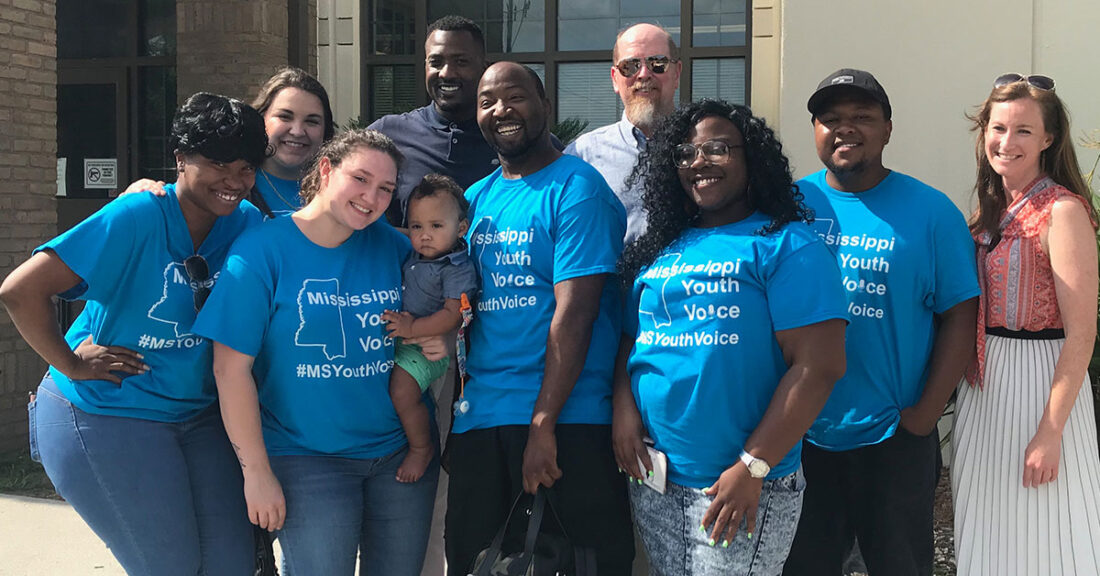Advancing Advocacy Through Youth-Adult Partnerships in Mississippi

Partnerships between youth and adults are central to the work of Mississippi Youth Voice, a group of young people with foster care experience who are leading efforts to improve policies and practices for youth in care across the state. Members of the Jackson, Mississippi-based group advocate for themselves and their peers, develop leadership skills and create resources for youth in and transitioning out of foster care.
This post turns the spotlight on Debra Jenkins-Kearney, who supports the Annie E. Casey Foundation’s work in Mississippi, and Claire Graves, who coordinates Mississippi Youth Voice. Graves is also the Mississippi site director for First Place for Youth — one of the Foundation’s Jim Casey Youth Opportunities Initiative® sites. Jenkins-Kearney and Graves answer questions about the impact and importance of youth-adult partnerships in their work.
Who are the members of Mississippi Youth Voice?
Jenkins-Kearney: Youth board members are ages 18 to 26, have foster care experience and have made a commitment to lending their voices to promote the success of other Mississippi youth in foster care. The group recently accepted five new members, bringing the total to 11.
Graves: We have young people who are working, who are still in school and everything in between. All of the members are achieving different goals in their lives. They all have a real desire to be an active participant in changing the child welfare landscape in Mississippi.
How has Mississippi Youth Voice championed youth-adult partnerships?
Jenkins-Kearney: The group has really been instrumental in facilitating change and creating space for social service agencies to experience the power of partnering with young people. One way this has been achieved is through training sessions with child welfare professionals. Members of Mississippi Youth Voice partnered with staff at the Mississippi Department of Child Protection Services [MDCPS] to plan and facilitate a series of 10 in-person trainings on youth engagement, youth rights and family-team meetings that reached more than 700 social workers from every county in the state. Youth were able to connect the content of the training to their own experiences and provide a unique perspective all while deepening their relationships with key state agency staff members.
Graves: Mississippi Youth Voice was invited to speak at the MDCPS annual leadership conference that catered to the child welfare agency’s social work supervisors, directors and state leaders. The agency has some incredible leaders who are committed to youth engagement. These leaders asked Mississippi Youth Voice to discuss specific areas where the agency is doing well and where it can improve in terms of supporting transition-age youth. Prior to the panel, the young people had lunch with the state’s commissioner of child welfare and talked with him one-on-one about how services for youth in foster care could be designed to better support their success. These are just a couple examples of really great partnerships that these young leaders have developed in their first year.
What are some of the long-term goals young people are working toward?
Jenkins-Kearney: One of the things Mississippi Youth Voice would like to take on is policy and practice change. One way these young leaders believe they can achieve this is by strengthening their advocacy skills. To support this, the Casey Foundation provided a series of trainings to Mississippi Youth Voice and MDCPS staff on strategic sharing. The trainings focus on appropriate and safe storytelling and how it can be used to advocate for change in practice and policy. This provided the opportunity for members of Mississippi Youth Voice to deepen their understanding and practice of advocacy messages to support and advance their work.
Graves: Mississippi Youth Voice is interested in growing in several ways. One way is doing more direct policy work focused on a couple of issues in which they want to see progress. This fall, members established two workgroups: one focused on improving mental health services and access for young people, and the other focused on increasing the number of youth in care who are able to learn to drive and get their driver’s license. These workgroups are off to a strong start developing concrete policy solutions to some of the key issues they see facing youth in care in Mississippi.
Ideally, we’d like to see Mississippi Youth Voice grow beyond Jackson so that we have other chapters throughout the state, partly so that more young people can have access to this work, but also because different parts of the state have different issues that should be prioritized.






